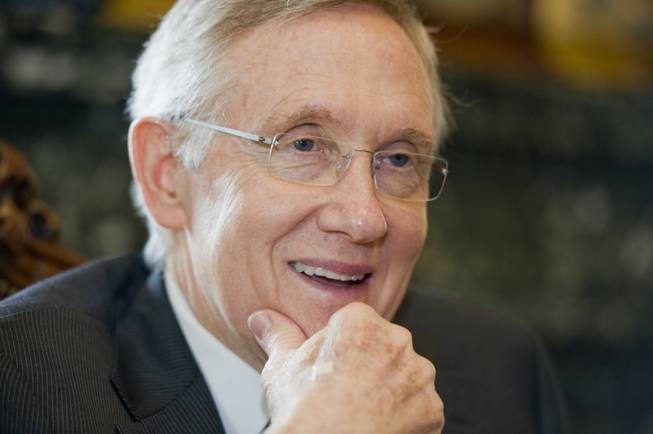
Tom Williams
Senate Majority Leader Harry Reid, D-Nev., is interviewed by the Las Vegas Sun in his office in the U.S. Capitol in Washington.
Sunday, Aug. 7, 2011 | 2:01 a.m.
Reid: We Brought Our Economy Back From Brink Of Disaster
Reid: We Brought Our Economy Back From Brink Of Disaster
Sun coverage
Sun archives
- S&P downgrades U.S. credit rating from AAA (8-5-2011)
- Senate passes debt-ceiling bill on bipartisan vote (8-2-2011)
- Obama, Senate reach deal on debt ceiling; Congress to vote today (7-31-2011)
- Debt deal now in hands of White House, GOP leaders (7-30-2011)
- Will the debt ceiling crisis trigger political magic? (7-28-2011)
- Harry Reid says debt ceiling negotiations ‘rocky’ (7-23-2011)
- Debt crisis: Deal sought in Washington to head off stock plunge (7-23-2011)
- Lots of private talks, but still no deal, on debt ceiling (7-21-2011)
- Boehner: House will compromise on debt limit (7-21-2011)
- Reid sends signal he won’t back compromise bill based on budget cuts (7-21-2011)
- With debt ceiling decisions will come consequences — practical and political (7-15-2011)
- Dean Heller takes hard line on debt ceiling, wants balanced budget amendment (7-15-2011)
- Latest developments in debt ceiling standoff (7-14-2011)
- Debt ceiling debate colors Nevada 2012 elections (7-8-2011)
- Harry Reid to keep Senate in session as debt limit deadline looms (6-30-2011)
- Berkley says no to raising debt ceiling, refuses ‘show vote’ (5-31-2011)
- Measure on raising debt ceiling not likely to gain traction (5-31-2011)
Barely two days after passing a historic agreement to avoid defaulting on the national debt, Senate Majority Leader Harry Reid is one of the few lawmakers left on Capitol Hill.
It’s vacation time in Washington, but not quite yet in Reid’s office, which on Thursday was still a pulsating nerve center of legislative appointments and activity. Despite that, Reid seemed happily relaxed as bustling aides shifted him through a busy schedule, at ease and in control of his familiar dominion.
It’s a mood that was absent during the last week of negotiations over how to raise the federal government’s debt ceiling. It was a week when Reid appeared publicly sidelined while the White House brokered a deal with Republican leaders.
But Reid says much of that was for show.
“I was involved in all of it,” he told the Sun in an interview at his office in the Capitol. “A lot of times I didn’t want it to be public because I didn’t want my caucus to think I was driving that lousy deal.”
There are myriad unanswered questions about where the final agreement will lead the country. One senior White House official described it as “the most complicated legislative Rubik’s cube ever invented.” Congress will spend months hashing out how to make all the deficit reductions required of itself.
But the wrenching political process leading to the final deal — a partisan machination that left Americans wholly unsatisfied with politicians — has also raised questions about how effectively congressional leaders will be able to wield their influence.
Reid was the first man in Washington to announce there was a deal to end the debt-ceiling crisis, put his endorsement behind it, and officially called on his caucus to support the compromise.
Although Republicans, led by House Speaker John Boehner, lauded the deal for representing “90 percent of what we wanted,” Reid put it somewhere on the spectrum between “unfair” and “lousy.”
He’s got a very simple explanation as to why.
“Revenue,” he said “The Republicans would not allow any kind of revenue. We’re not talking about tax increases. Revenue.”
•••
But that’s the conclusion of a complicated back story.
Reid started off at the center of the formal process of talks to raise the debt ceiling, a months-long process that kicked into concentrated, high gear in the past six weeks.
Reid, Boehner, Senate Republican Leader Mitch McConnell and House Democratic Leader Nancy Pelosi — and at times, their seconds-in-command — spent much of July going back and forth to the White House to negotiate a strategy to raise the country’s borrowing authority while reducing the deficit.
But by the second-to-last weekend before the default deadline, group talks at the White House had devolved and the parties were almost completely divided, according to a senior White House official.
“The group meetings took us as far as they could,” the official said. “Beyond that, shuttle diplomacy was the only way forward.”
Although the White House maintains the decision to disband was made by mutual consent, negotiating with President Barack Obama as Democrat-in-chief, instead of Reid, was clearly the GOP’s preferred strategy.
It made it look like Reid had been relegated to the sidelines.
“We’re doing our very best to keep a sense, on top of what’s going on,” Reid said when reports emerged that the president was speaking to Boehner to try to craft a grand bargain. “A lot of what’s going on, we don’t know. I haven’t been in the day-to-day negotiations.”
A few days after Boehner departed those talks, the spotlight shifted to McConnell.
“I think we all know, if the president decides to reach an agreement, the rest of the Democrats will fall in line,” McConnell told reporters of his negotiations with Obama and Vice President Joe Biden.
Reid reinforced the impression: “I haven’t heard anything from the Republican leader,” he said.
But throughout that period, Reid says, he was maintaining steady contact with everyone: sometimes in his office, sometimes in McConnell’s, sometimes even in Boehner’s, and on the phone with the White House — according to their aides, a half-dozen times a day, on average.
•••
The particulars of this deal aside, Reid was, and is, fording uncharted waters in his role at the helm of the Senate. Ever since there’s been a majority leader’s position in that body, there’s never been a Democratic majority leader sandwiched between a Democratic White House and a Republican House of Representatives.
Not so long ago there was a parallel situation, when the parties were flipped. In fact, the 1980s — when Republican Ronald Reagan was president and Democrat Tip O’Neill was speaker of the House — are roundly treated like the glory days of congressional diplomacy; they are an especially common reference these days, since one of the most significant deals they struck was to reform Social Security.
But nobody ever really talks about what Senate Majority Leader Howard Baker — a Republican known as the “Great Conciliator” — was doing behind the scenes.
But out of the public eye is where Reid sees his greatest strength. “I’m a behind-the-scenes guy. That’s how I’m able to get things done,” Reid said, describing his own role in these and previous rounds of legislative negotiations. “That’s how I’m successful.”
•••
Historical comparisons can only go so far as the persons though, and Reid doesn’t talk about Boehner the way most people talk about Tip O’Neill.
“It was a long, hard process, and what slowed it up so much was Boehner trying to get that thing of his passed,” Reid said, referring to Boehner’s cuts-heavy, balanced budget amendment-based legislation he struggled to get past the House the last week of July.
Since that vote, Reid has taken great pains to come up with euphemisms that describe his distaste for Boehner’s bill. But earlier, he took even greater pains to separate the speaker from the element of the Republican Party Reid has always treated as its scourge: the Tea Party.
“I did a much better job of separating him than he did himself,” Reid said of Boehner. “I didn’t think that he was as pulled into the Tea Party folks as he ultimately proved to be. But he obviously is.”
•••
If the extent to which Boehner is beholden to the Tea Party is changing Reid’s impression of the negotiating partner he has across the aisle, there’s a similar metamorphosis happening among GOP leaders as they assess Reid.
“If Sen. Reid had said to the president last Sunday night: ‘This is the bill you’re going to get, I hope you can sign it,’ it’s a different conversation from ‘Are you OK with this?’ ” one GOP leadership aide said. “If he wants to stand up to the president, he reinstates himself as the go-to guy, but if you’re going to defer to the president ...” and left off with a shrug.
Reid, behind-the-scenes worker that he is, doesn’t himself seem fully satisfied with the extent to which Obama employed his renowned powers of public persuasion in the debt-ceiling debate.
“I’d like the president to be more aggressive. But he is who he is. That’s his style and I can’t change that,” Reid told the Sun.
But, he said, the debt ceiling posed the president a Solomon-esque quandary.
“What the president was faced with is they were willing to cut the baby in half,” Reid said; the baby-splicing being, in this situation, the equivalent of the economy defaulting.
“It was a long, hard process ... we were within an hour, maybe an hour and a half of not being able to do a bill,” Reid said. “Obama, I think, did a lot with nothing.”
•••
And part of what he, and they, produced, included many marks of the majority leader.
The 12-lawmaker Joint Committee that will meet over the next three months to draft a budget of deficit reductions was Reid’s brainchild, first drafted under a backup solution he was hammering out with McConnell to give the president borrowing authority over a congressional disapproval. The reflexive mechanism of disapproval motions and vetoes they focused is also a fundamental part of the final compromise bill.
“The reason I liked (my proposal) so much is that it was so simple,” Reid said, adding that had he been calling all the shots, he would have gotten the president and congressional members meeting in ad hoc committees to ditch their dreams of a “grand bargain” much earlier than they did.
“I thought it became so repetitive, and why waste time on it? The Republicans aren’t going to do anything on revenue. I think we should have stopped that a long time ago,” he said.
White House officials said Reid — along with Pelosi — pushed to reduce the effective cut to Medicare providers in the worst-case scenario, across-the-board triggers that kick in if Congress can’t approve the committee’s compromise by Christmas, from 4 to 2 percent, and spare Social Security, veterans’ benefits, and Medicaid any chop at all.
But the bill seems to have split the jury of economic opinion. On Friday, Standard & Poor’s rating agency downgraded the U.S. credit rating for the first time in history, criticizing Congress for “delegating to the Select Committee” decisions on anything more comprehensive than “relatively modest savings on discretionary spending.” S&P complained, like Reid, that “for now, new revenues have dropped down on the menu of policy options.”
“The statutory debt ceiling and the threat of default have become political bargaining chips in the debate over fiscal policy,” S&P’s statement read.
•••
But it’s not just to the debt-ceiling standoff that the critique applies.
The debt-ceiling crisis is only the most recent experience these congressional leaders have had coming to the absolute brink of an existential crisis: Before this, there was this spring’s shutdown showdown, and before that, a massive tax compromise during last year’s lame-duck session.
Most of those face-offs pundits have awarded as strategic victories to the Republicans.
“I think they’ll declare a lot of victories, that doesn’t mean they’re victories,” Reid said, declining to draw patterns about what past practice would mean for future negotiations. By law, the next round of the cuts vs. revenues deficit fight takes place in the Joint Committee; but everyone expects there will be a role for the White House and these congressional leaders at every step of the way.
“Each set of facts are different and call for different conclusions,” he said. “I wish I could go someplace else, but ... at the end of each of these big problems, there have to be adults trying to work out the solution.”
The White House seems pleased enough with how that’s going for Reid.
“The best measure of his leadership on the issue is the overwhelming support he got from his caucus on the final bill,” a senior White House official said. Reid did pull together the largest percentage of any caucus or conference to support the bill: Almost 87 percent of Senate Democrats backed the legislation, topping the 72.5 percent of House Republicans, almost 60 percent of Senate Republicans, and exactly half of House Democrats that also supported the compromise bill.
“He has a tough job holding a broad caucus together,” the senior White House official said. “It was extraordinary under the circumstances.”
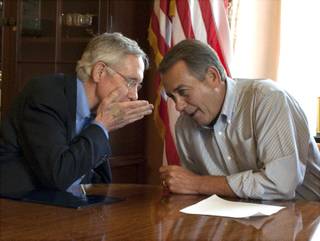
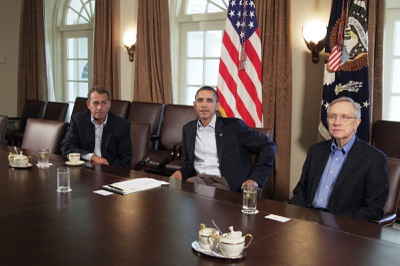
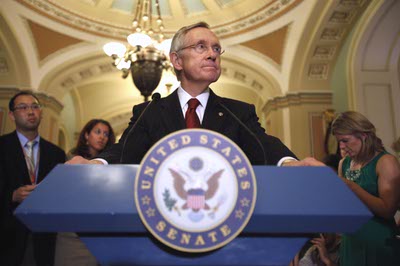
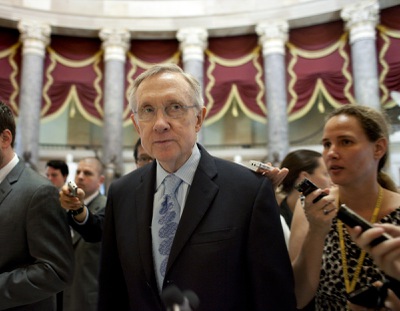

Join the Discussion:
Check this out for a full explanation of our conversion to the LiveFyre commenting system and instructions on how to sign up for an account.
Full comments policy